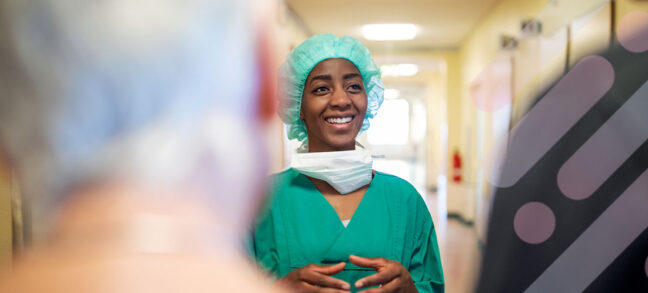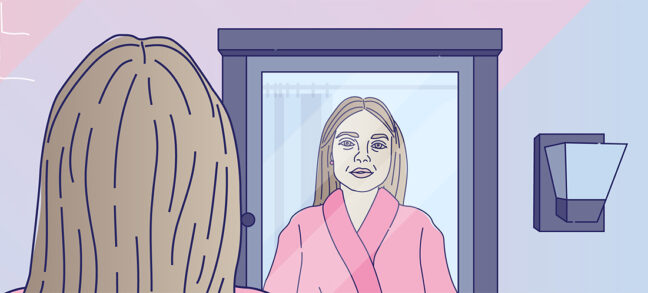For many, summer months mean sun-drenched beach days, trips to family cabins and lake houses, picnics in the park, taking a cool dip and feeling the water gliding over your skin, and softball games that stretch into twilight. But summer can also be a challenging time for some.
A breast cancer diagnosis can upend your entire life. Thoughts of treatment, mastectomy surgery and reconstruction take over, and many women wonder if they’ll ever be able to lead a “normal” life again. Summer suddenly means coordinating treatment around vacations, navigating the post-surgery swimsuit rack, missing the warmth of the sun on post-mastectomy skin, and taking extra precaution when it comes to UV rays.
But summer doesn’t have to be a bummer when you’re on a cancer journey. Whether you’re just starting treatment, in recovery or living cancer free, with the right information and a little preparation, you can embrace all the season has to offer.
go for a swim
This one can be a little tricky depending where you are in your cancer journey. If you’re currently undergoing treatment, it’s recommended that you stay away from the chlorine in swimming pools, which can irritate your skin around the treatment area.1 Once your treatment is over, you have plenty of options to enjoy some time on or in the water. More and more companies are making swimwear designed for women who have had a single mastectomy, double mastectomy or reconstruction. Some also offer lightweight swim forms designed to be worn in chlorine and saltwater.2
enjoy active time outside
Besides swimming, the days between May and September are filled with opportunities to get outside and get active, including walks in the park, biking the trails and summertime sports leagues. Participating in these activities has many health benefits, from improving mental health to promoting better sleep.3 Naturally, your level of activity will depend on where you are in your treatment, and you may want to continue exercise during and after cancer treatment.4 You should consult your doctor to create an activity level that is right for you.
explore lightweight hats, scarves and wigs
If you’re experiencing hair loss after chemotherapy, you may be used to wearing hats, wigs and scarves, but the summer heat can pose new challenges—and opportunities—when choosing a head cover. Use the rising temps as an excuse to experiment with your look. Opt for a pixie cut or bob-style wig, a lighter scarf, or a wide-brimmed hat. Or skip the head covering altogether (but don’t forget the sunscreen). As a base for your hats, scarves and wigs, some recommend a breathable bamboo undercap that will not only keep you cooler, but also protect you from harmful UV rays.5
safely soak up the sun
It’s always important to protect your skin from the powerful summer rays, but at certain stages of treatment and recovery, you may need to be extra cautious. Chemotherapy and radiation therapy can leave the skin even more sensitive to sunlight.6 Take additional care during this time, wear a hat, avoid being outdoors between 11 a.m. and 3 p.m., and stay on top of the SPF application. If you’re undergoing radiotherapy, make sure to cover the treated area at all times. If you’ve recently had a mastectomy or reconstruction surgery, keep any scars well covered to safeguard this delicate new skin. In addition to sunscreen, consider UV protective clothing and full-coverage swimwear options.
manage the heat
The summer sun can seem to burn even hotter in the wake of treatment-induced menopause—and the hot flashes that come along with it—especially when systemic hormone treatment is not an option.7 Be ready to fight off the flashes by having cold water bottles and a personal, portable fan on hand, no matter where your summer takes you. Dress in breezy, natural layers and go light on the makeup. At bedtime take a cool shower and slip an ice pack or cooling pillow into your pillowcase to keep the night sweats at bay.
connect with friends and family
Summer is the perfect season to spend time with family and friends. The days are longer, the weather is warmer and vacation time is abundant, so take advantage and reconnect with your community. Research has shown this social support may improve quality of life for breast cancer survivors8 and may even help you maintain physical well-being after treatment.9 Invite a friend or two to join you for a summer walk or a trip to the park, and make the best of the extra time together.
fully experience the summer you deserve
The freedom of summer means different things to different people, but everyone should be able to enjoy it in their own way, regardless of where they are in their health journey. Whether that means taking quiet time to reflect and heal, starting a new adventure to celebrate recovery, or simply feeling the sun on your skin again, you deserve to have a happy, healthy and “normal” summer.
- https://www.breastcancer.org/tips/exercise/treatment/radiation
- https://www.breastcancer.org/treatment/surgery/reconstruction/prosthetics
- https://www.mayoclinic.org/healthy-lifestyle/fitness/in-depth/exercise/art-20048389
- https://www.breastcancer.org/tips/exercise/treatment
- https://www.breastcancercare.org.uk/about-us/news-personal-stories/hair-loss-tips-all-seasons
- https://www.breastcancercare.org.uk/about-us/news-personal-stories/sun-care-after-breast-cancer-treatment
- https://www.menopause.org/for-women/menopauseflashes/menopause-symptoms-and-treatments/breast-cancer-survivors-hot-flash-treatments
- Kwan ML, Ergas IJ, Somkin CP, Quesenberry CP Jr, Neugut AI, Hershman DL, Mandelblatt J, Pelayo MP, Timperi AW, Miles SQ, Kushi LH. Breast Cancer Res Treat. 2010 Sep;123(2):507-24. doi: 10.1007/s10549-010-0764-8. Epub 2010 Feb 6. https://www.ncbi.nlm.nih.gov/pubmed/20140494?report=abstract
- Leung J, Smith MD, McLaughlin D. Psychooncology. 2016 Oct;25(10):1222-1228. doi: 10.1002/pon.4131. Epub 2016 Apr 6. https://www.ncbi.nlm.nih.gov/pubmed/27062092
Resensation Blog

How does mastectomy impact the nerves in the breast?
One sometimes overlooked aspect of mastectomy is its impact on nerves. Read what happens to nerves during mastectomy and explore…
Read More
What happens during implant breast reconstruction with Resensation®?
By repairing sensory nerves, Resensation® enables you to potentially regain sensation to your chest. Read how this procedure works during…
Read More
how resensation® helped Leanna feel secure in her family’s future
With Resensation®, Leanna can be there to watch her kids grow up—without losing the feeling of being whole.
Read More
sensory retraining: what is it, and how can it help me after resensation®?
Sensory retraining is a series of exercises designed to help you reconnect with your body after breast reconstruction with Resensation®.
Read More